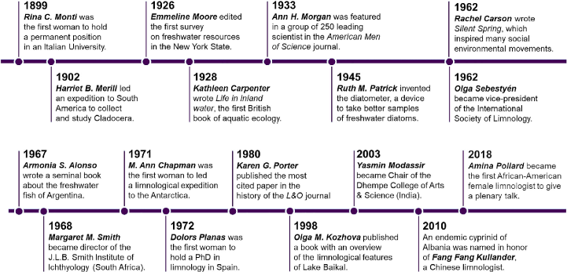 Timeline of the “Herstory” in limnology, where selected achievements of female limnologists are highlighted. Timeline of the “Herstory” in limnology, where selected achievements of female limnologists are highlighted. Last October, a new publication of the group was published in the journal WIREs WATER. In this article, we aimed to bring into the spotlight the past and current situation of female limnologists. Firstly, the historical contribution of women to limnology (HerStory in Limnology) was revised. We compiled biographical information including the name, bibliography, and relevant contributions of 73 female limnologists, from different countries, periods and disciplines (https://zenodo.org/record/7104480#.Y5rx4XbMK3A). Secondly, we analyzed the present situation of female limnologists. We highlighted how the current metrics used to evaluate scientific performance could be detrimental for women’s career, and how women are underrepresented in awards and positions of maximum responsibility in the scientific sphere, hindering their visibility. Here you have some shocking/worrying numbers to illustrate our findings:
The article finishes with a summary of initiatives working for gender equity in the field of limnology, including our work as a Gender and Science Group of the Iberian Association of Limnology (www.genderlimno.org), the Earth Science Women's Network (https://eswnonline.org/) or the Justice, equity, diversity, and inclusion (JEDI) task force by the Society for Freshwater Science (https://freshwater-science.org/justice-equity-diversity-inclusion-jedi-task-force). This article raises awareness of barriers that women faced and still face, and encourages to embrace models of leadership and scientific management different from the ones currently established. Only this way, we will be able to achieve gender balance not only in our professional careers, but also in the other dimensions of our lives. Read the full article here: https://doi.org/10.1002/wat2.1616 Núria Catalán, Maria Anton-Pardo, Anna Freixa, Pablo Rodríguez-Lozano, Mireia Bartrons, Susana Bernal, Ana Genua-Olmedo, Clara Mendoza-Lera, Gabriela Onandía, Xavier Benito, María Mar Sánchez-Montoya, Miguel Cañedo-Argüelles Iglesias, Ada Pastor, Anna Lupon. 2022. Women in limnology: From a historical perspective to a present-day evaluation. WIREs WATER, e1616. This post was written by Maria Anton-Pardo, a lecturer on zooplankton, meta-communities and temporary aquatic ecosystems at the Universidad Rey Juan Carlos, Spain.
2 Comments
Academic conferences are major scenarios to disseminate and learn about scientific advances, but also to bring opportunities for developing collaboration networks or displaying a certain status and prestige. However, not all researchers benefit equally from these events. Recent studies showed compelling evidence that women have reduced opportunities to participate in academic conferences compared to men. Discrimination against women has been reported in abstract selection, coauthor lists, convener panels and invitations to keynote talks (Farr et al. 2017, Sanchez-Montoya et al. 2016, Lupon et al. 2019). Yet gender bias does not stop there: women generally ask fewer and shorter questions than their male counterparts (Hinsley et al. 2017), and tend to feel more excluded from intellectual discussions and social events (Lupon et al. 2019, Settles and O’Conner 2014). Collectively, these “chilly” experiences may affect women’s job satisfaction and lower their intentions to pursue a scientific career (Biggs et al. 2018).
These findings stress the importance of advancing towards more women-inclusive conferences, even in countries with good perceptions of women as scientists. Due to these facts, we strongly encourage organizers to develop and follow guidelines for inclusive scientific meetings, with special focus on:
References: Biggs J, Hawley PH, Biernat M. 2018. The academic conference as a chilly climate for women: effects of gender representation on experiences of sexism, coping responses, and career intentions. Sex Roles, 78: 394–408. Catalán, N., Anton‐Pardo, M., Freixa, A., Rodríguez‐Lozano, P., Bartrons, M., Bernal, S., Genua‐Olmedo, A., Mendoza‐Lera, C., Onandía, G., Benito, X. and Sánchez‐Montoya, M.M., 2022. Women in limnology: From a historical perspective to a present‐day evaluation. Wiley Interdisciplinary Reviews: Water, p.e1616. Farr CM, Bombaci SP, Gallo T, Mangan AM, Riedl HL, Stinson LT, et al. 2017. Addressing the gender gap in distinguished speakers at professional ecology conferences. Bioscience, 67: 464–468. Hinsley A, Sutherland WJ, Johnston A. 2017. Men ask more questions than women at a scientific conference. PLoS One, 12: 1–14 *Lupon A, Rodríguez-Lozano P, Bartrons M, Anadon-Rosell A, Batalla M, Bernal S, et al. 2021 Towards women-inclusive ecology: Representation, behavior, and perception of women at an international conference. PLoS One, 16: e0260163. Sánchez-Montoya M. M, Pastor A, Aristi I, del Arco AI, Antón-Pardo M, Bartrons M, et al. 2016. Women in limnology in the Iberian Peninsula: biases, barriers and recommendations. Limentica, 35: 61–72. Settles IH, O’Connor RC. 2014. Incivility at academic conferences: Gender differences and the mediating role of climate Sex Roles, 71: 71–82. Tulloch AIT. 2020. Improving sex and gender identity equity and inclusion at conservation and ecology conferences. Nat Ecol Evol., 4: 1311–1320 |
CategoriesArchives
March 2024
AuthorDifferent members of the Gender and Science AIL group will contribute to the Blog, as well as invited collaborators. |

 RSS Feed
RSS Feed